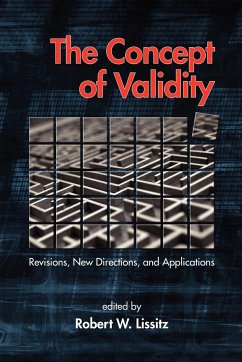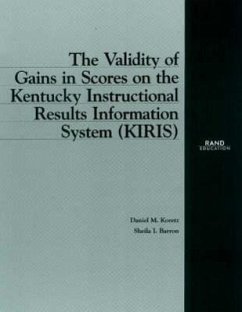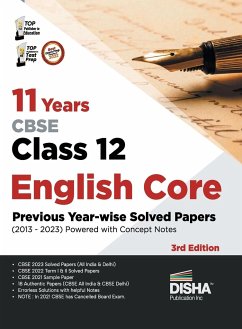
The Concept of Validity
Revisions, New Directions and Applications (PB)
Herausgeber: Lissitz, Robert W.
Versandkostenfrei!
Versandfertig in 1-2 Wochen
62,99 €
inkl. MwSt.

PAYBACK Punkte
31 °P sammeln!
Validity is widely held to be the most important criterion for an assessment. Nevertheless, assessment professionals have disagreed about the meaning of validity almost from the introduction of the term as applied to testing about 100 years ago. Over the years, the best and brightest people in assessment have contributed their thinking to this problem and the fact that they have not agreed is testimony to the complexity and importance of validity. Even today, ways to define validity are being debated in the published literature in the assessment profession. How can such a fundamental concept b...
Validity is widely held to be the most important criterion for an assessment. Nevertheless, assessment professionals have disagreed about the meaning of validity almost from the introduction of the term as applied to testing about 100 years ago. Over the years, the best and brightest people in assessment have contributed their thinking to this problem and the fact that they have not agreed is testimony to the complexity and importance of validity. Even today, ways to define validity are being debated in the published literature in the assessment profession. How can such a fundamental concept be so controversial? This book brings focus to diverse perspectives about validity. Its chapter authors were chosen because of their expertise and because they differ from each other in the ways they think about the validity construct. Its introduction and ten chapters bridge both the theoretical and the practical. Contributors include most prominent names in the field of validity and their perspectives are at once cogent and controversial. From these diverse and well-informed discussions, the reader will gain a deep understanding of the core issues in validity along with directions toward possible resolutions. The debate that exists among these authors is a rich one that will stimulate the reader's own understanding and opinion. Several chapters are oriented more practically. Ways to study validity are presented by professionals who blend current assessment practice with new suggestions for what sort of evidence to develop and how to generate the needed information. In addition they provide examples of some of the options on how to present the validity argument in the most effective ways. The initial chapter by the Editor is an effort to orient the reader as well as providing an overview of the book. Bob Lissitz has provided a brief perspective on each of the subsequent chapters as well as presenting a series of questions regarding validation that the reader will want to try to answer for themselves, as he or she reads through this book. This book's topic is fundamental to assessment, its authors are distinguished, and its scope is broad. It deserves to become established as a fundamental reference on validity for years to come.














